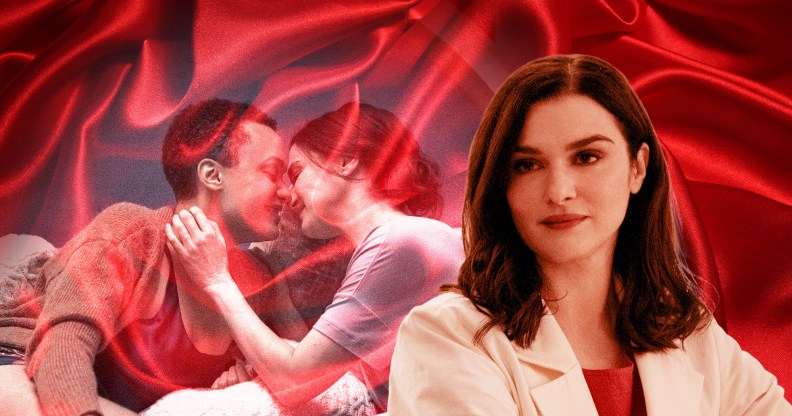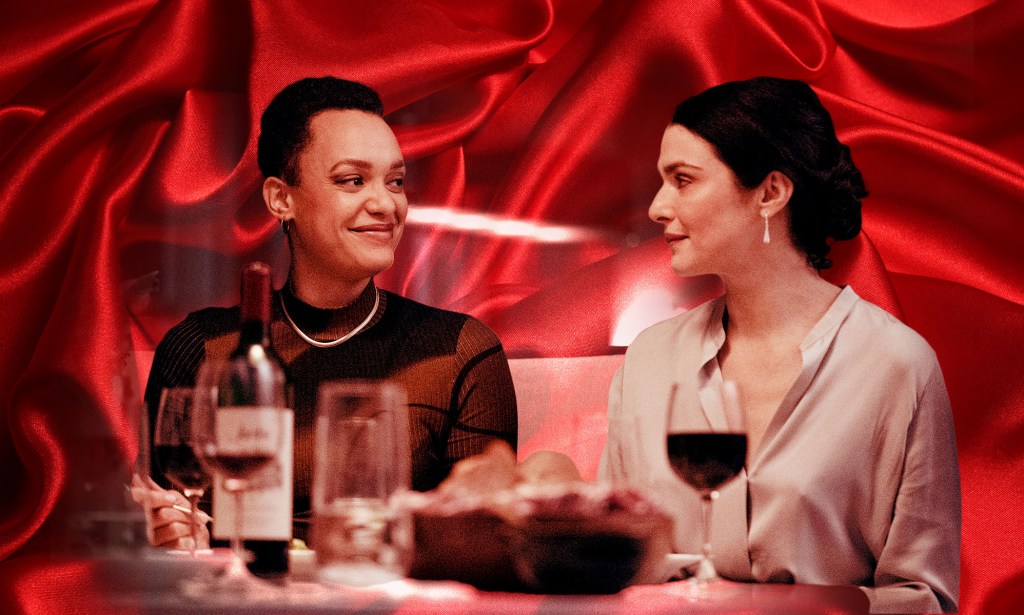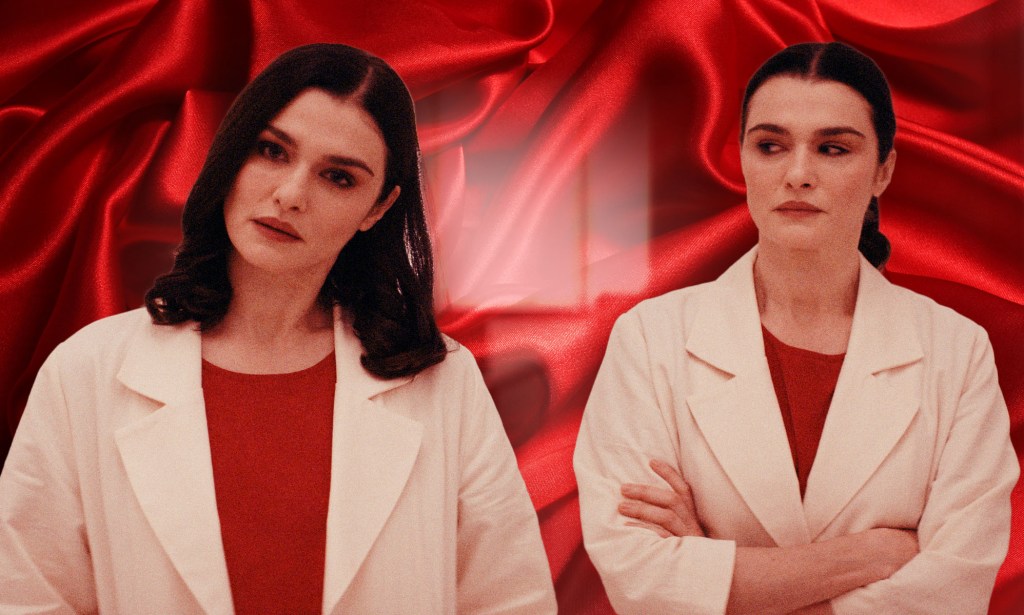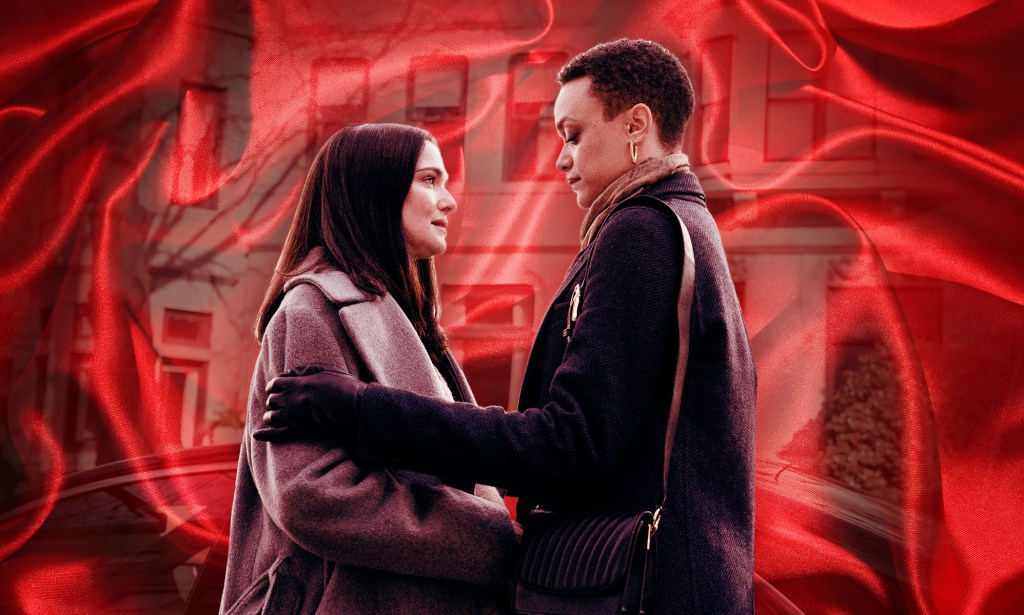Rachel Weisz on queer love stories, Dead Ringers and why she’s ‘honoured’ to be a lesbian icon

Rachel Weisz opens up about taking on the roles of the Mantle twins in a reboot of Cronenberg’s bloody classic, Dead Ringers. (Amazon Prime Video)
In a new adaptation of Cronenberg’s bloody classic Dead Ringers, British superstar Rachel Weisz pulls double duty as the infamous Mantle twins.
It doesn’t take long for things to get weird in Dead Ringers. Soon after we’re introduced to identical twin doctors Elliot and Beverly Mantle, we course through crude jokes about sisterly incest, excruciating deliveries, substance abuse, blood-splattered hospital floors, torturous screams and a close-up of a slimy embryo fished out from the toilet bowl, stroked lovingly in the palm of a hand.
That’s all in the first five minutes, by the way, which is a little sign that this show is not for the faint of heart – or stomach.
A gender-flipped reimagining of David Cronenberg’s cult 1988 thriller, Prime Video’s new six-episode series replaces Jeremy Irons’ yin-yang gynaecologists with two famed obstetricians, both played by the captivating Rachel Weisz.
At their Manhattan hospital, Beverly and Elliot deliver babies, swap places and seduce their unwitting patients. Beyond sharing drugs and sexual partners, though, the twins also harbour a dream of opening a cutting-edge birthing centre that will allow them to revolutionise maternal healthcare, even as they seek to push the ethical boundaries of medical science.
While the era of the reboot is in full swing right now (box-office hits Grease and Fatal Attraction have also received the TV treatment recently) Dead Ringers is certainly a bold choice for an adaptation.
Cronenberg’s body-horror is still widely regarded as a flawless piece of cinema, from Irons’ magnetic performance as the disturbed siblings down to the terrifying visuals of red scrubs and sharp surgical tools.
Weisz, who jokes that she’s a “bit of a sucker for a psychosexual thriller”, says the idea for a reboot was gestating for a long time before coming to term.
“I’ve never forgotten the film,” she tells me when we sit down ahead of the world premiere, though she freely admits that the project presented a “huge challenge”. What started as a daydream, she explains, then led to conversations over a period of time with showrunner Alice Birch, who began the task of creating two deliciously dysfunctional sisters.

Dead Ringers is subversive, of course, because it hands all the power back to its female characters. Thirty-five years after Elliot and Beverly Mantle first terrorised viewers in the gynaecology field, the gender flip enables the show to interrogate maternal healthcare through the female gaze.
Birch, the screenwriting powerhouse behind Florence Pugh hits Lady Macbeth and The Wonder, BBC adaptations of Normal People and Conversations with Friends, and the second season of Succession, assembled an all-female writers’ room over Zoom during the early days of the pandemic; and Weisz ending up joining every single day.
“We talked for 6-8 hours, about different books, films, references, different stories. It was just the loveliest.” What kind of things came up in discussion? “Gosh, a lot”.
She thinks for a moment. “We referenced a photographer called Heji Shin who takes incredible photographs of babies being born. Cindy Sherman. There was lots of talk about the abject body, female pleasure, hysteria. Ariel Levy who writes for The New Yorker… she wrote an incredible story about miscarriage that she was having. There were so many references every day, but that’s just a splash of things.”
Weisz, who also executive produces the series, gives full credit to Birch for creating characters that emerged as “radically different people on the page” – no improvisation necessary. Visibly identical only in their beauty, the twins have wildly different personalities.
Shy, serious Beverly is full of compassion for expectant mothers, and genuinely wants to change the birthing system for the better. Elliot, her brazen, amoral doppelgänger, sates her carnal appetite with food, drugs and casual sex, and is more interested in having a space to conduct illegal Frankensteinian experiments away from the prying eyes of the FDA.
Even for a talent like Weisz, a double-duty performance required a deliberate approach. “We generally started with Elliot, because she’s the big sister and sets the pace a bit,” she explains. “We’d shoot the scene and then I’d change into Beverly.”
While Weisz was acting as one Mantle, her double, newcomer Kitty Hawthorne, would stand in for the other. Immediately after, Weisz would swap costumes and shoot the scene again.
In case you’re wondering, though, she couldn’t pick a favourite twin. “They’re gloriously close,” she adds. “There’s a lot that I think is quite gorgeous about their lives together, but it’s also quite problematic.”

Problematic indeed. Twins share a special bond, but nothing comes close to the Mantles’ toxic codependence, which is threatened by the arrival of Genevieve (Britne Oldford), a beautiful television actress who forges a romantic relationship with Beverly.
Named after Geneviève Bujold, who played Claire Niveau in the 1988 film (one of the show’s many Easter eggs), Oldford says her character offers Beverly an opportunity to escape the chaos of her dysfunctional attachment to Elliot; who, needless to say, is less than pleased that her sister wants to pursue an exclusive romantic relationship.
“That relationship feels like, to some degree, a respite,” she explains. “We all consciously really wanted to create this very warm, romantic, healthy-feeling dynamic.” So persuasive is the acting in this show, though, that you’re never really sure if you want healthy love to triumph over the twins’ obsessive bond.
“There are people who could be rooting for the love story and other people who think she’s the disruptor,” says Oldford. “Everyone can make up their own mind.”
Another thing that’s enjoyable? The chemistry between Beverly and Genevieve. If you’re going to have a romance that destabilises the twin dyafd, it had better be believable.
“Sometimes you work on projects where the chemistry has to be sort of channelled and pulled from the ethers, because it’s more work,” says Oldford. That wasn’t the case when it came to building rapport with Weisz. “It was just so easy. Everything felt so safe and comfortable. And everyone sort of understood the assignment.”
Working every day with Weisz, she also realised that it was “so beautiful to have that experience with another woman”, and afforded a rare opportunity to explore love and intimacy from a female perspective. “I think, especially on set, it made it feel very safe and very understood and very natural. And I think that that lends itself to the overall tone of that relationship.”
Weisz, of course, has form when it comes to playing morally complicated lesbians. Take her acclaimed performance in the 2019 indie drama Disobedience, about forbidden love in tight-knot Orthodox Jewish community, or her Bafta-winning turn as Queen Anne’s secret lover in the brilliantly bonkers 2018 period romance The Favourite.
Did any of these defining roles inform how she approached the queer relationship in Dead Ringers? Weisz chooses her words carefully. “I think when you’re you’re telling a story about a human being who falls in love with a human being … Beverly is queer and she falls in love with this human being; with Genevieve. So, yeah, this relationship was about the possibility of love.”
What’s arguably more striking, Weisz says, is how Genevieve presents Beverly with an opportunity for growth. “I think it’s incredibly romantic, the storyline that Alice wrote for Beverly and Genevieve, and the possibility of a really normal, healthy life.”

It goes without saying that many of Weisz’s fans, particularly those who attribute their queer awakening to her sword-wielding turn in The Mummy series, will be beside themselves with the sapphic representation in Dead Ringers (a special mention here must also go to Jennifer Ehle, who gives a scene-stealing performance as a ruthless lesbian billionaire).
Such is the Weisz effect on queer women, that at a special UK screening at the BFI the night before our interview, an excited woman jokes about asking Weisz on a date during an audience Q&A, while another flustered fan stumbles over her words after announcing that she’s flown all the way from Australia to see the Oscar winner on stage.
How does she feel about her status as a lesbian icon? “Well, I’m really honoured to be what you just said”. She laughs. “A queer icon, it’s a real honour.” She’s not on the internet, she counters, so the discourse does pass her by. She smiles. “I just hear it sometimes.”
Dead Ringers also makes its way into the world at a time when battle lines are being drawn in the US over women’s bodily autonomy, which makes the show’s gender-flipped perspective on maternal healthcare all the more confronting; not least its brutal childbirth scenes.
“Death is on screen all the time, violence is on screen all the time,” says Birch. “I find it interesting that childbirth just isn’t depicted in that way. You’re consistently shocked that you don’t know this, you don’t see it on our screens.”
There are quietly powerful moments, too, that show the painful business of being a woman. Bleeding through your clothes at work? Relatable. Doctor ignoring persistent pain? All too often. The show will surely spur discussion around women’s bodies and healthcare, and while Birch stresses that she and Weisz simply set out to film what they were interested in, as opposed to making political statements, she says it would be “amazing” if the show “gave people words to start conversations.”
For all the horror in Dead Ringers, (there really is a lot of blood), the show is riotously fun; and without giving too much away, Birch hopes that the show will “consistently surprise” viewers.
Anyone who’s ready for a double dose of an unhinged Rachel Weisz, meanwhile, will be pleased to know that the show “definitely evolves” as the twins unravel on their path of self-destruction.
“It starts very grounded. But tonally, it gets more operatic,” Weisz adds with a wry smile. “The volume might go up to 12”.
All six episodes of Dead Ringers are available to watch now exclusively on Prime Video
How did this story make you feel?

